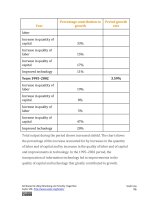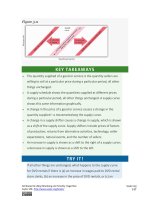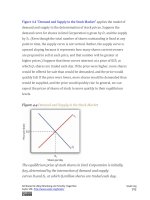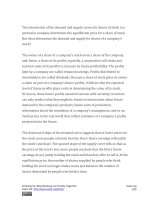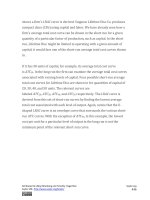Authors libby rittenberg 874
Bạn đang xem bản rút gọn của tài liệu. Xem và tải ngay bản đầy đủ của tài liệu tại đây (510.14 KB, 1 trang )
Industry
Improvements
least 30% in real terms since deregulation, and average
prices for commercial and industrial customers have
declined more than 30%. In addition, service has been
more reliable as shortages have been almost completely
eliminated.
Economist Clifford Winston found substantial benefits from deregulation
in the five industries he studied—airlines, trucking, railroads, banking, and
natural gas.
Source: Clifford Winston, “U.S. Industry Adjustment to Economic
Deregulation,” Journal of Economic Perspectives 12(3) (Summer 1998): 89–
110.
But there are forces working in the opposite direction as well. Many
businesses continue to turn to the government for protection from
competition. Public choice theory suggests that more, not less, regulation
is often demanded by firms threatened with competition at home and
abroad. More and more people seem to demand environmental protection,
including clear air, clean water, and regulation of hazardous waste and
toxic waste. Indeed, as incomes rise over time, there is evidence that the
demand for safety rises. This market phenomenon began before the birth
of regulatory agencies and can be seen in the decline in unintentional
injury deaths over the course of the last hundred years. [4] And there is
little reason to expect less demand for regulations in the areas of civil
rights, handicapped rights, gay rights, medical care, and elderly care.
The basic test of rationality—that marginal benefits exceed marginal
costs—should guide the formulation of regulations. While economists
Attributed to Libby Rittenberg and Timothy Tregarthen
Saylor URL: />
Saylor.org
874
